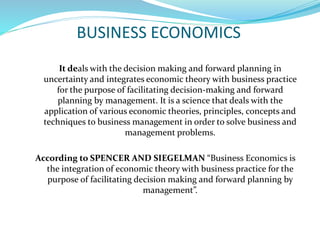Exploring the Link Between Business and Economics in today's Digital Era
Exploring the Link Between Business and Economics in today's Digital Era
Blog Article
Comprehending Financial Concepts for Better Business Decision-Making
In the facility landscape of modern-day organization, a detailed understanding of financial principles can significantly boost decision-making processes. By examining aspects such as market frameworks and consumer behavior, organizations can tailor their techniques to line up with competitive characteristics and consumer needs. In addition, insights into need elasticity and possibility prices provide a framework for enhancing source allotment. The application of these financial theories typically exposes unforeseen obstacles and possibilities that can redefine critical approaches. What effects do these insights hold for the future of organization strategy?
The Essentials of Economic Concept
Financial concept acts as the foundation for comprehending how organizations and people choose in the visibility of scarcity. At its core, economic concept examines the allotment of minimal resources to satisfy unlimited wants. This essential principle of deficiency requires compromises, compelling decision-makers to assess the benefits and costs related to various choices.
Both key branches of financial concept are microeconomics and macroeconomics. Microeconomics concentrates on private representatives, such as companies and consumers, examining their habits and interactions in particular markets. It stresses ideas like supply and demand, price elasticity, and market stability, which are essential for recognizing exactly how rates are determined and how sources are distributed.
On the other hand, macroeconomics takes a look at the economic climate all at once, addressing broader concerns such as inflation, joblessness, and economic development. It provides understandings into systemic phenomena that affect all economic representatives, leading policymakers in crafting effective economic approaches.
Ultimately, a strong grounding in economic theory is crucial for reliable company decision-making. By comprehending the concepts of deficiency, compromises, and market characteristics, organizations can much better browse complex settings and make notified options that improve their affordable benefit.
Trick Economic Indicators
Key financial indicators act as crucial tools for evaluating the health and direction of an economy, offering valuable insights for service decision-making. These indicators are quantitative measures that mirror the economic performance and can be classified right into leading, delaying, and coincident signs.
Leading indicators, such as customer self-confidence indexes and securities market trends, predict future economic task, permitting organizations to anticipate changes in the market. Delaying indicators, like joblessness prices and company profits, supply understandings into the economic situation's past efficiency, assisting companies to examine lasting patterns. Coincident indications, such as GDP growth and retail sales, fluctuate simultaneously with the economy, using a real-time snapshot of economic conditions.
Recognizing these signs makes it possible for businesses to make enlightened decisions regarding financial investments, resource allotment, and tactical preparation. As an example, an increase in consumer confidence may prompt companies to raise production in anticipation of greater need. Alternatively, rising joblessness prices could result in a reevaluation of growth strategies. By closely keeping an eye on these essential economic indications, services can navigate uncertainties and position themselves successfully in the ever-changing economic landscape, eventually improving their decision-making procedures and lasting success.

Market Structures and Characteristics
Comprehending market frameworks and characteristics is critical for organizations aiming to grow in affordable atmospheres. blog Market frameworks, extensively classified into ideal competition, monopolistic competitors, oligopoly, and monopoly, considerably influence pricing techniques, product distinction, and affordable behavior. Each framework presents distinct obstacles and possibilities that can dictate a firm's strategic direction.
Oligopolies, identified by a couple of dominant gamers, lead to interdependent decision-making; firms must carefully think about competitors' feedbacks to their activities. Monopolies exist when a solitary company controls the market, resulting in maximum prices power however often bring in governing examination.
Understanding these dynamics enables businesses to prepare for market fads, adapt techniques, and enhance source allocation. Additionally, identifying just how exterior variables like innovation and guideline impact these frameworks can boost critical planning. By grasping market frameworks and dynamics, companies can make educated decisions, eventually enhancing their affordable placement and driving lasting growth.
Customer Actions Insights
Consumer behavior plays a crucial function in shaping organization methods and end results. Comprehending Get the facts how consumers make acquiring choices, their preferences, and the aspects affecting their behavior can considerably boost a firm's capability to meet market demands. Key insights right into customer habits can be originated from evaluating demographics, psychographics, and behavior patterns.
Market variables such as age, revenue, education and learning, and sex level give a foundational understanding of target markets. Psychographics dig deeper, checking out customers' way of lives, mindsets, and worths, which can affect brand commitment and item assumption. Behavioral insights, such as purchasing frequency and response to sites promotions, are indispensable for customizing marketing efforts.
In addition, exterior variables like financial problems, cultural fads, and technological improvements also influence customer options. Throughout economic declines, consumers may prioritize vital items over high-end products, modifying demand patterns.
Applying Economics to Technique
Insights gained from consumer habits contribute in formulating reliable business techniques. By leveraging financial principles, companies can much better recognize market dynamics, optimize source allotment, and improve affordable placing. Assessing demand elasticity, for circumstances, allows companies to adjust pricing strategies to make the most of income while continuing to be eye-catching to consumers.
In addition, understanding market division allows organizations to customize their offerings, ensuring they satisfy the details requirements and preferences of varied consumer groups. Business and Economics. This targeted strategy improves consumer fulfillment and cultivates brand commitment

Including video game theory right into calculated preparation likewise supplies understandings right into affordable actions, enabling firms to anticipate competing actions and design counter-strategies successfully.

Verdict
To conclude, a thorough understanding of financial principles significantly enhances service decision-making. By checking out market frameworks, reviewing consumer behavior, and evaluating key financial indications, firms can create reliable methods that line up with market demands. The application of principles such as demand flexibility and chance prices even more aids in maximizing source allotment and investment choices. Inevitably, incorporating these financial concepts promotes enhanced critical selections, facilitating much better expectancy of market trends and affordable actions, therefore driving earnings.
In the complicated landscape of contemporary service, a detailed understanding of economic principles can significantly improve decision-making procedures.Leading indications, such as customer self-confidence indexes and supply market patterns, forecast future economic activity, enabling services to anticipate changes in the market. By very closely keeping track of these key economic signs, services can browse uncertainties and place themselves effectively in the ever-changing financial landscape, inevitably enhancing their decision-making processes and lasting success.
By leveraging financial principles, services can much better understand market dynamics, optimize source appropriation, and enhance competitive placing.In final thought, a detailed understanding of economic concepts significantly improves business decision-making.
Report this page